|
|
 |
 |
 |
 |
 |
 |
 |
Partners |
 |
 |
 |

 |
 |
Advanced Prototype Research |
 |
| Thanks to the smart balancing between the long experience of some of its specialists in the aeronautical domain and the enthusiasm of a skilled team of engineers. APR has grown with the passion for five axes simultaneous machining. Starting from the 3D CAD model (or any other text-file geometry) APR is able to supply single parts and production for highly complex components sculptured out of a forging or bar, such as impellers and integrally bladed disks. APR’s machining centres capacity can provide parts up to 1500 mm diameter, both flank and point milling in HSC technology, in a wide range of materials: stainless steels, high refractory alloys, titanium alloys, aluminium alloys. If requested APR can supply complete components to the customer, including raw material, non-destructive test and special processes through a cluster of aerospace-qualified sources closed to Turin. APR is the ideal development & production centre suited to provide vertical solutions for the following sectors: Aero Engines, Space, Power Generation, Offshore & Marine. APR core business in 5-axes simultaneous machining is appreciated by some of the main aero-engine and aero-structure industries for the production of complex parts for structures in any alloy up to 2500 mm: ribs, frames, brackets, supports, links; The APR’s Quality System is certified: UNI EN ISO 9001:2000, AS/EN/JISQ 9100 and qualified by its main international customers. Main references: Avio, Turbomeca, Volvo Aero, Alenia-Aermacchi, GE Oil&Gas, Alstom, Ingersoll Rand. |
 |

 |
 |
AVIO SpA |
 |
Avio is a leading aerospace Company. It was established in 1908.
Nowadays, we have four major lines of business:
- Modules and components for military and civil aircraft and helicopter propulsion systems;
- MR&O and Services for military and civil aircraft and helicopter propulsion systems;
- Space propulsion and tactical propulsion systems;
- Jet Derivative engines and Automation system for naval and industrial applications.
In the field of engines for civil aircraft, Avio is a partner in major development and production programmes conducted with the world’s most important engine manufacturers: General Electric, Pratt & Whitney and Rolls-Royce. With Rolls-Royce, Avio is currently working on the Trent 900, a modem turbofan, developing a thrust of 80,000 pounds; this engine is earmarked for the A380 “super jumbo” of Airbus Industry, which is scheduled to start service in 2006. Under two major collaboration agreements recently signed with General Electric and Rolls-Royce, Avio shall participate in the development of the F-136 engine for the Joint Strike Fighter, the future U.S. Air Force multi-role fighter. Avio’s responsibilities include the design, development and production of components for the low-pressure turbine and the accessory drive.
|
 |

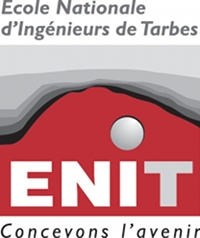 |
 |
L'Ecole Nationale d'Ingénieurs de Tarbes |
 |
| The main competences of the LGP Laboratory of ENIT School in the ACCENT project are in the link between the dynamic behaviour of the machine-tool-workpiece group and the machined surface finish, in High Speed Machining. This corresponds to static and dynamic deformations, caused by cutting forces, forced vibrations or regenerative vibrations. The consequences on the machining quality (dimensional, geometrical, surface quality, residual stress, surface finish, micro structure), are studied and allow optimising cutting conditions in order to increase the material removal rate and the quality of the machining. Since 2002, collaboration between TURBOMECA and LGP/ENIT has lead to many studies on vibrations during machining. |
 |

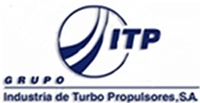 |
 |
Industria de Turbo Propulsores, S.A. |
 |
Industria de Turbo Propulsores, S.A (ITP) was established in 1989. Their current shareholders are Rolls-Royce (47%) and Sener Aeronáutica (53%). The business activity of ITP ranges from overhaul and assembly of existing and new aero-engine propulsion systems respectively, to the research, design, development and manufacture elements of gas turbines for civil and military aircraft application, as well as for other industrial areas (power generation, marine propulsion, etc).
The company has two plants for industrial purposes: one in Ajalvir (Madrid), where assembly and overhaul work is carried out, and a second one in Zamudio (Vizcaya), dedicated to manufacture gas turbine components. It also exist an engineering facilities located at San Fernando (Madrid). Design, engineering and R&D activities are performed in San Fernando as well as in Zamudio.
ITP develops and manufactures gas turbine components in Spain, maintaining international co-operation with other industrial manufacturing groups for new aero-engine studies and designs, as well as improvements of existing turbines. All the stages for the development of the product are covered inside ITP, from the conceptual studies to the final product, customer support, and maintenance and overhaul. Around 1000 employees with more than 300 engineers are working within ITP in the two plants located at Madrid and Bilbao. Working in different aero programmes such Trent 500, 700, 900 y 1000, BR715, EJ200, TP400, MTRI390… and several industrial gas turbines such as LM2500, LMS100
The ITP Group is specialised in the manufacturing of components for aeronautical engines and gas turbines such as casing, pipes, nozzles, distributors, seals, short axles, nozzle guide vanes and discs. ITP has incorporated new manufacturing technologies that will allow the Company to deal with the integral manufacturing of pieces from the programmes in which it takes part.
In the research area, ITP has been involved in a wide number of research programmes both national and European; amongst the European projects ITP has participated in FP5 & FP6 in STREP and IP projects such as ANTLE, SILENCER, ICAS-GT, OPTISPRAY, TATEFF, VIVACE or VITAL. Investigation areas are focused in Low Pressure Turbines and hot structures technologies; aerodynamics, aeroacustics and mechanical technologies are developed towards the development of optimised components.
ITP is already involved in several activities regarding control of machining conditions and surface integrity with Mondragon University for critical parts. Besides, ITP was also involved in MANHIP project where useful experience was gained regarding machining of critical parts.
|
 |

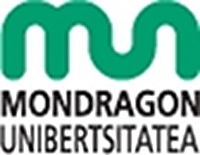 |
 |
Mondragon Goi Eskola Politeknikoa S. Coop. |
 |
MGEP (Mondragon Goi Eskola Politeknikoa S. Coop.) is a co-operative integrated into both Mondragón Corporación Cooperativa (Mondragón Co-operative Corporation) and Mondragón Unibertsitatea (the University of Mondragón) and is the legal owner of Mondragón Unibertsitatea's Faculty Of Engineering. Its principal activities are training and research, development and innovation. The Mondragón Faculty Of Engineering was opened in 1943, as the result of an initiative led by Father José Mª Arizmendiarrieta, the founder of the Mondragón Co-operative Experience. Over the years, the School has grown steadily and has helped bring about the creation of numerous innovative business experiences: Fagor (Ulgor),Ikerlan, Alecoop, CEI-Saiolan (a seedbed for new companies in advanced sectors) In 1985 the Lifelong Training Department, which had existed almost since the School was set up, was renamed IRAUNKOR, and strove to respond to the increasing need for refresher courses aimed at facilitating the adaptation of company workers to new technologies. TR&D activities constitute a key element for the ongoing updating and renovation of teachers' knowledge in line with the real situation of the business world, and play an important role in students' education, through the carrying out of End-of-Course Projects in local companies. We are also developing a new concept of a university campus (GARAIA Innovation Pole), aimed at generating value for companies and societies. This initiative groups University Institutes, Technology Centres and company R&D Departments in a single physical environment. More precisely, the research team that will take part in ACCENT is the “High Performance Cutting” research field, led by Prof. Pedro Arrazola. Around 40 people comprise the research team, with complementary levels of knowledge ranging from around 20 undergraduate granted students, 9 PhD students, up to 2 Professors). The “High Performance Cutting” research field, actively researches in 3 main fields of knowledge all of them with a modelling orientation:
1. Tool/material interaction in machining operations and its modelling
2. Micro machining and High Speed Cutting
3. Grinding
|
 |

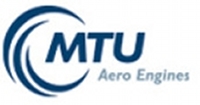 |
 |
MTU Aero Engines GmbH |
 |
| MTU Aero Engines is the largest German manufacturer of aero engines with applications in civil and military sectors. MTU Aero Engines employs about 6.746 staff at its main site at Munich and at MTU Maintenance shops in Hanover, Berlin-Brandenburg, Vancouver and Zuhai. The annual turnover exceeded 2.1 billion Euros in 2005. The comparison of the world largest engine manufactures indicates MTU on the sixth position. The company is a risk- and revenue -sharing partner across all major commercial thrust categories like business jets, narrow body and wide body applications. Therefore MTU has built up strong co-operation structures in Europe and America in the aero engines field. MTU Aero Engines develops and manufactures components for engines covering a wide thrust range reaching from propulsion systems for small business jets (PW 300) up to large commercial aircraft (GP 7000 / PW 6000 / V 2500). In the field of military aircraft engines MTU is a major partner in respective European programmes providing engines for the Eurofighter (Typhoon), Tornado, Tiger and A400 M. The main component currently supplied - and expected to remain the core business - is the turbine section, while the activities are extended to the design and manufacture of compressors for future applications as well. New concepts as high-speed low spool technology and the inter-cooled recuperative aero-engine are seen as key issues for future development. MTU has built up a strong expertise in the field of gas turbine materials and components engineering, production, inspection and overhaul, gained from its design work, production and overhaul departments as well as from participation in previous national and international research programmes. Highly qualified personnel with several years of experience in material science and engineering as well as in aero-engine component design and testing will be allocated to the project, guaranteeing successful work on the research activity and, at the same time, exploiting the results by incorporating the knowledge gained in the design system of modern gas turbines. |
 |

 |
 |
Rolls-Royce Plc |
 |
| Rolls-Royce plc operates in four global markets - civil aerospace, defence aerospace, marine and energy. It is investing in technology and capability that can be exploited in each of these sectors to create a competitive range of products. The success of these products is demonstrated by the company's rapid and substantial gains in market share over recent years. As a result, engine deliveries have grown and the company now has a total of 54,000 gas turbines in service worldwide. The investments in product, capability and infrastructure to gain this market position create high barriers to entry. Rolls-Royce has a broad customer base comprising more than 500 airlines, 4,000 corporate and utility aircraft and helicopter operators, 160 armed forces and more than 2,000 marine customers, including 50 navies. The company has energy customers in nearly 120 countries. Rolls-Royce employs around 37,000 people, of which 22,000 are in the UK. Forty per cent of its employees are based outside the UK - including 5,000 in the rest of Europe and 8,000 in North America. Most of the engines in service will have operational lives of 25 years or more, generating an assured aftermarket demand for the provision of spare parts and services. The company's strategy is to maximise aftermarket revenues, which have increased by 60 per cent over the past five years due to the development of a comprehensive services capability. Annual sales total nearly £6 billion, of which over 40 per cent currently comes from aftermarket services. The order book stands at more than £17 billion, which, together with aftermarket demand, provides visibility as to future activity levels. |
 |

 |
 |
Société d'Etudes et de Recherches de l'ENSAM |
 |
| SERAM is a Research and Technological Organization associated to the famous French Engineer School named "Ecole Nationale Supérieure d'Arts et Métiers". SERAM and ENSAM have received, in 2006, the quality label "Institut CARNOT", on behalf of their common structure ARTS. SERAM is a private association, created in 1973 to promote research works as well as scientific, technical & industrial studies within ENSAM graduate & research centres (called CER ENSAM). Its aim is to develop contractual relations with the industrial world, besides day by day its great renown keeps on growing. SERAM manages just about 700 contracts per year with the key economic players (big groups or small and medium firms, French and European administrations, associations...) and earns a turnover close to 8 millions euros a year. SERAM has 9 offices located in Aix-en-Provence, Angers, Bordeaux-Talence, Châlons-en-Champagne, Chambéry, Cluny, Lille, Metz and Paris. SERAM manages the 22 laboratories activities which are spread over the ENSAM centers and other partners schools. SERAM headquarters, located in Paris, gather the administrative and financial services. A local branch provides for any industrial needs on the spot and in any Ensam centers. In Cluny, the SERAM machining team has developed works and expertise in metal cutting/machining and particularly in High Speed Machining and difficult-to-cut materials (heat resistant alloys, Ti based alloys, Ni based alloys…). |
 |

 |
 |
Snecma |
 |
| Snecma is a company of Safran Group. Safran Group is a high technology group, specialised in Propulsion, Communication, Equipment and Defense Security, with annual sales of more than 11.3 billion Euros (2006). Snecma is one of the world's leading aerospace propulsion companies, with a wide range of propulsion systems on offer. By drawing on these different propulsion technologies, Snecma leverages its ability to deliver innovative solutions and develop the multidisciplinary synergies which are critical for tomorrow's air and space power plants. In the civil aviation sector, Snecma develops, produces and markets the best-selling family of CFM56 turbofans through CFM International, a joint company equally owned with General Electric. These engines power many different Airbus and Boeing jetliners. Snecma designs, develops and builds military aircraft engines offering world-class performance. For example, the M88 engine that powers France's new-generation Rafale fighter has the highest turbine inlet temperature in the world. Our engines power over 20 different types of transport, training and combat aircraft for 41 armed forces around the world. A military aircraft powered by Snecma takes off somewhere in the world every minute. Snecma leads the team of European companies that make propulsion systems and equipment for other launch vehicles, satellites and space vehicles. |
 |

 |
 |
Turbomeca |
 |
| Turbomeca is a member of the Propulsion branch of the SAFRAN Group, an international high-technology group with four core businesses: aerospace propulsion, aircraft equipment, defense security and communications. Turbomeca is the world leader in the design, production and sale of gas turbines for helicopters. It also produces turbines for trainer and support. Turbomeca’s reputation for reliability, simplicity and cost optimisation is unique. Our current product philosophy is founded upon significant investment in research and development, which allows our customers to take advantage of the most recent technology (design, the latest materials, sound and emission reduction…) upon a real potential to increase power output and upon a comprehensive engine follow-up. With 14,000 turbines in operation and 2,200 customers in 150 countries, Turbomeca provides a world-wide quality service, with its 14 sites, 2 subsidiaries, 25 Turbo Support centres (maintenance), 24 repair centres (repair and overhaul) and its 90 technical field representatives. Turbomeca’s industrial and commercial sphere of activity is represented by its 14 sites, all of which have industrial and repair facilities at their disposal, found throughout France and found in Great-Britain, the USA, Australia, Brazil, Africa, Canada, Germany, India, Japan, Pacific Asia and South America. The two subsidiaries (Microturbo, CGTM) are based in France. Turbomeca makes a point of being open to the whole world and is thus making great progress. Since it was founded 69 years ago, Turbomeca has accumulated experience of 83 million operation hours and manufactured over 50,000 turbines. In 2006, Turbomeca manufactured 1 087 engines and repaired 2,295. The sales amounted to 870 million Euros,. i.e. an increase of 19.6% on the previous year. Today the workforce totals 4,048 employees in France, and no less than 5,048 throughout the world. |
 |

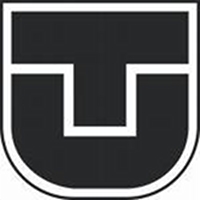 |
 |
Technical University of Kosice |
 |
| The Technical University of Kosice (TUKE) was established in 1952. The content of education and research at this University includes the entire complex of sciences and economics. The Technical University of Kosice was established with the aims to satisfy the needs of Eastern Slovakia in education and research. The transmission of knowledge – instruction in its broadest sense – is continuously the University’s major concern. The TUKE seeks to maintain a cohesive and interdependent relationship between their teaching, research and service activities. The TUKE has 9 faculties: Faculty of Mining, Ecology, Control and Geotechnology; Faculty of Metallurgy; Faculty of Mechanical Engineering; Faculty of Building; Faculty of Electrical Engineering and Informatics; Faculty of Production Technologies; Faculty of Economy; Faculty of Arts, Faculty of Aeronautic. Independent institutes: Life-long Centre; Engineering Pedagogy Canter; Institute of Regional and Communal Development, Scientific and Technology Park (in development). The TUKE is a public institution. They are a modern scientific University providing a full range of technological and economic education at both under-graduate and post-graduate levels. At the present the TUKE offers study in 25 fields of study in Bachelor degree, 66 specialisations in Master degree and 43 special disciplines in PhD study. The mission of the Technical University is to be leading research University that prepares students for their professions, admission them to advanced degree programs, and lifelong learning. The TUKE manages and maintains many well-established scientific and pedagogical contacts with a number of universities abroad. The University is a member and coordination centre of The Association of Carpathian Region Universities (ACRU – involving 27 Universities from 6 countries like members). Today it is nearly 16 000 full time and part time students and 970 academic staff. The TUKE manages and maintains many well-established scientific and pedagogical contacts with a number of universities abroad. The University have relevant successful participation in EU and international projects (115 research and development EU projects in 2006.) The Faculty of Mechanical Engineering (Mech Eng) belongs to the biggest faculty at the TUKE. Faculty has stable quantity of students – one-fourth of all university students. The Faculty currently has accredited 8 disciplines of bachelor studies, 22 disciplines of master degree and 13 disciplines of PhD studies. The Faculty has been significantly developed within the structure of research in accordance to the innovative development of the Slovak mechanical engineering focused mainly at the sophisticated engineering systems in the Eastern region of Slovakia. Recent trends in the Faculty development include building research laboratories (centres for excellence) for collaboration with national and international companies. |
 |

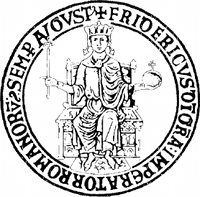 |
 |
University of Naples |
 |
The University of Naples Federico II is one of the oldest universities in the world, founded in 1224 by Frederick II von Hohenstanfen, Emperor of the Holy Roman Empire and King of Naples.
Today, the University of Naples Federico II, a government institution of the Italian Republic, is among the most important nationally and internationally recognised Italian universities. It has 13 Faculties, 87 Departments, 2000 professors, 5000 technical and administrative staff, 100000 students and an annual budget of about 600 MEuro (2005).
In 1985, the Department of Materials and Production Engineering (DIMP) started its activities within the Faculty of Engineering of the University of Naples Federico II. Research at DIMP is strongly motivated by advances in new materials, innovative manufacturing processes and systems, and related information technologies. DIMP supports a broad spectrum of basic, strategic and applied research, developing links with both large and small companies. It has a yearly research budget of about 8 MEuro (2005), a very large number of industrial partners and collaborative projects with more than 20 countries in Europe and outside Europe. As a result, DIMP is one of the largest and most successful Departments in the entire Italian university system, with a strong team of over 120 people, including young post-doctoral/doctoral researchers and experienced design and manufacturing engineers complemented by marketing and administrative staff. DIMP has a vast experience in participating in European Commission Research and High Education programmes such as Brite/EuRam, Sprint, Human Capital and Mobility, Socrates/ Erasmus, Tempus, Asia IT&C, FP6 NMP Network of Excellence (I*PROMS and 4M), FP6 IST STREP (iWARD), etc. To date, it has been involved in more than 30 EC-funded projects. DIMP is involved in several doctorate programmes: PhD in Materials Engineering and PhD in Production Technology and Systems. Moreover, it runs an International Doctorate Project: PhD in Intelligent Technologies and Systems, involving several European and non-European Universities. The PhD programmes, all of 3 years duration, carry out on a regular basis the training of approximately 60 PhD students.
|
 |

 |
 |
Volvo Aero Corporation |
 |
| Volvo Aero Corporation is a wholly owned subsidiary of AB Volvo. In cooperation with the world’s leading producers, we develop and produce components for aircraft and rocket engines with high technology content. Service and maintenance are an increasing proportion of our business. We offer an extensive range of productivity-boosting services, including sales of spare parts for aircraft engines and aircraft, overhaul and repair of aircraft engines and the sales and leasing of aircraft engines and aircraft. Our business philosophy is based on close cooperation with our aerospace partners. We’ve chosen to specialize in order to be truly competitive in each of our fields of operation. This is mirrored by our business concept "Specialized for Partnership" and our vision "Best Partner". |
 |

 |
 |
Laboratory for Machine Tools and Production Engineering (WZL) |
 |
| The Laboratory for Machine Tools and Production Engineering (WZL) of Aachen University of Technology (RWTH), founded in 1906, is one of the largest and most productive university institutes of its kind in Europe. With over 580 employees, the institute carries out both basic and applied research projects directly addressing the needs of industry, finding practical solutions for more modern and efficient production. The WZL consists of four departments of which one is the Chair of Manufacturing Technologies. Within the Chair of Manufacturing Technology intensive scientific work was carried out and main focuses are set on the following research topics: machining, grinding, metal forming, process chain design, FEA simulation of work pieces and processes, process and product monitoring and related topics. The involved Department for Process and Product Monitoring is mainly working on system developments for Monitoring solutions, sensor development and the construction of adaptive control system or machining operations. Next to this software development in collaboration with the company National Instruments are carried out. |
 |
|
 |
 |
 |
 |
 |
|
 |
 |
|
